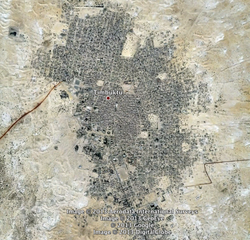
First, as a historian, I love artifacts. There is just something amazing about going to a museum or library and holding/seeing something that is thousands of years old. It is just a simple moment of awe when you can be so close to artifacts that have had a significant role in the creation of the modern world. Everything from my Great, Great Uncle's surveying tools used out west during the mid 1800s to the illuminated manuscripts found in the Cleveland Art Museum. I suppose our (Garth and I) fascination with artifacts is one reason why we speak so often about leaving digital footprints worth following. Technology really has changed nearly ever aspect of life. Today's artifacts are digital. They say that once something reaches cyberspace, it is there forever. It is much more permanent than the stone roads of Rome or the castles of Medieval Europe. Our students are creating living artifacts. There legacy isn't something that will be unearthed hundreds of years from now...their legacy is organic; it is ever-changing and developing. People are using it today to learn how kids in our two districts see the world. People are looking at their work and creating a picture of 7th grade learners in Northeast Ohio, much like an archeologist finding a piece of earthenware and deciding what it might say about the people that used it.
To this end, I think that it is important that libraries and other academic institutions truly embrace the digitization of the written word. It is very hard to image loosing your cultural identity in this day and age. Students FaceBook and Twitter accounts are an almost permanent record of how they felt about events throughout their lives. It is the reason that I started a Gmail and Facebook account for my three year old. I want her to have a record of her life. It is still too soon to know if there is information that was destroyed in Timbuktu that can never be regained. I can say that if that information had been scanned and saved, then the world may have lost the physical artifacts, but the knowledge (which is the important part) would be safe. Beyond digitization, this information needs to be made readily available to whomever wants access to its knowledge. When I was in college it was the world of JSTOR. This encrypted digital library housed academic information, so of course we can't just let anybody see it! I'm joking of course, but the implication to password protection and fee-driven digital archives is nothing more than the ancient art of controlling people by controlling information. If you are poor or do not attend college, than we do not want you reading the most recent research.
Ideas like GoogleBooks and The Miller Center are great examples of how information can be made freely available to anybody with the passion to find it. I encourage everyone to activity fight for the digitization and liberation of information.
 RSS Feed
RSS Feed


